A Little Rebellion (Crimson Worlds III) Read online
Page 22
Samuels walked slowly across the room and dropped his bulk into one of Stark’s buttery soft leather chairs. The priceless antique creaked a bit, but it held fast. Rafael Samuels had always been a large man; when he was a young Marine, the armorers had to design a customized suit to fit him. Back then he was tall and enormously strong – he’d been called “The Bull” in his first platoon. In recent years he’d added fat to the list of adjectives used to describe him.
“Hello Rafael, thank you for staying. Soon we will be past the need for you to hide behind that hologram.” Stark gestured toward a heavy crystal decanter on his desk. “May I offer you something? This is a fine Single Malt…you’ll not see its like often.” Samuels nodded appreciatively. “I wanted to discuss the final stages of our plan regarding the Marine Corps, and I felt that was better handled…shall we say…discreetly.” He poured the amber liquid into a cut crystal glass as he spoke, handing it over to Samuels.
“Yes, Number One, I quite agree.” He reached out, taking the drink from Stark. The glass nearly disappeared in his massive hand. “Secrecy is essential, as it has been since we began this business.”
“Please…when we are not in a Directorate meeting, it is Gavin. We are not so formal in these private strategy sessions.” Stark thought he sensed something from Samuels...not regret exactly, but perhaps hesitation, discomfort. That isn’t surprising, he thought…Samuels is about to become the blackest traitor in Marine Corps history. Though that really won’t matter much, since there will no longer be a Marine Corps. He suppressed a self-satisfied grin.
“I must commend you, Rafael, on your farsightedness.” Stark amazed himself sometimes how earnestly full of shit he could be. Samuels needed a little boost now, and Stark was going to tell him whatever he wanted to hear. “The Corps has served its purpose, but it is a dangerously independent organization. That was acceptable when it was a small frontier force, but it is too powerful now to operate without oversight.” He looked at Samuels, and his expression ached with sincerity…all false, of course. “The culture of the Marine Corps is too firmly embedded. It cannot change…we must start over.”
Stark was confident Samuels understood his comments. My God, he thought disdainfully, it must be easier in some ways to be such a stupid, simple creature. Rafael Samuels had been going nowhere in the upper levels of the Corps until Stark targeted him for recruitment. But the power and manipulation of Alliance Intelligence went to work, turning Samuels from a supernumerary general shunted off into a dead end posting into one of the primary commanders of the Corps…and ultimately commandant. It took a lot of effort…and two unnatural deaths of senior officers, but Stark had seen it done. Samuels had been a partial participant for much of the ride; Stark had provided friendship and support for quite some time before he made the actual recruitment pitch. It always pays to get them addicted first, and then make the sale, he thought. Gavin Stark was a gifted manipulator with considerable mastery of human psychology.
“You are right, of course, Gavin.” Samuels raised the glass to his lips, taking a sip. “And you are right about this Scotch as well.”
Stark leaned back in his chair, comfortable he had chased away whatever doubts had been nagging at Samuels. “So we are prepared to initiate the final phase of the plan. With your concurrence, I will authorize my operative on Arcadia to execute the first part of the program.” Stark looked Samuels right in the eye as he spoke. Arcadia was the part of the plan he expected to be toughest for Samuels, but the giant Marine didn’t object – he just nodded slowly, signaling his assent.
“Subsequent to the successful execution of step one, you will order direct Marine intervention against the rebellions as a response to events on Arcadia. This will likely cause a fracture in the Corps, with some formations following the orders and others disobeying. We will utilize the confusion to disband the Marine Corps entirely. Without equipment and support, the isolated units will be easy to mop up with our new Directorate troops…after they finish off the rebels.”
Samuels nodded again, but he was still troubled. First, he wasn’t sure how easy it would be to mop up any Marines, no matter how cut off and poorly equipped they were. Frankly, he’d be wary of a cornered squad throwing rocks; whatever you wanted to say about the Corps, its people knew how to fight. And these Marines were going to be pissed.
The finality of the actions they were setting into motion nagged at him. He’d always felt he’d been underappreciated in the Corps, and he hadn’t risen to the level he felt he deserved until his allies at Alliance Intelligence intervened. But to be the man who destroyed the Corps? It was one thing to agree to it, to plot and scheme for years, and quite another to actually do it. He had been bitter and resentful, and Stark had used that to recruit him, but now part of him wished he could escape the path he himself had helped create.
It was too late to go back, though. He’d done too much already, and it was only a matter of time until he was discovered…and that would be an ugly day, one he probably wouldn’t survive. No, he couldn’t go on much longer like this…the Corps had to go, and covering his own tracks became just one more reason. Resigned to the reality of the situation, he tried to put his doubts aside, and he resolved to see things through. Besides, he couldn’t even imagine what fate Stark would dream up for him if he backed out now.
“Rafael, I know this is difficult for you.” Dutton had been quiet up to now, but he decided it was the time for him to intervene. His voice was weak and throaty, but he forced out the words. Samuels was a traitor and a turncoat, but he wasn’t an automaton. Dutton knew Stark never understood regret, probably because he’d never felt it. But Dutton had, and he could see Samuels was struggling, and he needed a little support – or a little manipulation, depending on the viewpoint. “But it must be done, and there is solace in that very necessity.” He paused, then he touched on the thought he knew was on Samuel’s mind: “It is too late to alter the plan anyway, so let us make the best of it.”
Dutton glanced at Stark. They had been allies for years, and friends too. Stark was like a son to Dutton, and the old spy had done everything he could to help his protégé rise to power. He was worried now that Stark would overreach once he was gone. Dutton’s life had been ruled by caution, but Stark was more audacious, more likely to make a bold gamble if it served his purpose. He was a genius and a master psychologist, but he had a failing as well, never truly understanding some of the seemingly irrational points of view caused by conscience. He tended to expect more frigid practicality in people’s decisions than he was likely to get. It was a dangerous blind spot, likely to get him in trouble when Dutton was no longer there to run interference.
Samuels sat quietly, considering Dutton’s words. He knew his doubts were pointless; he was fully committed now anyway. Soon he could retire his hologram and openly join the Directorate. He would be wealthy beyond his wildest imagination and one of the most powerful people in the Alliance. He would command the new Directorate army, of course, and he would forge it in his own image. Perhaps I will pay for this devil’s bargain with my soul, he thought, but at least I got a good deal.
Samuels raised his glass. “To our success.” Stark returned the gesture, draining his glass with a smile. Dutton was not drinking, but he nodded and raised his arm in solidarity.
“Well, if you gentlemen will excuse me, I have some work to do.” Samuels’ voice was calm - he was a bit more at peace with what he had to do…or at least he was resigned to it. “The end game begins.”
Stark nodded and rose from his seat. “I’ll walk you out, Rafael.” He moved around the desk, gesturing for Samuels to lead the way, and the two walked through the door into the now-deserted reception area.
Dutton rose to his feet, slowly, painfully. He paused to look out the window, truly absorbing the amazing view he had seen thousands of times but never fully appreciated…until now. It was a feeling, really, and nothing more that told him this was the last time he would see it.
He could hear Stark in the
corridor, saying goodbye to Samuels. The two of them had devised the plan together, and Dutton was gratified that it appeared close to success. Now, standing here looking out over the city, he felt something…was it a twinge of remorse? The Corps had done their part for a century to safeguard the Alliance’s interest in space. Did they deserve better than this as a reward? Foolish thoughts, the kind of nonsensical sentimentality he had always despised in people. He tried to push them away, but he couldn’t…not completely. He’d had regrets before, but never about doing what he knew had to be done.
Ethics and morality were not concepts Dutton allowed to interfere with his actions. To him they were constructs, convenient tools useful for crowd control. Dutton had been driven all his long life by expediency, by practicality. His morality was whatever worked, whatever kept things together for another day. His roots were in a different time, when the survival of the Alliance, even of mankind, was still in doubt, the world in ashes from almost a century of war.
He thought he understood the colonists. Indeed, he had a better view into the mindset of those on the frontier than Stark ever could. They valued freedom, they craved self-determination. But they were small societies and, for the most part, wealthy ones, tapping the vast resources of virgin worlds. How would they fare a century from now? A millennium? Would they deal any better with the enormous social problems caused by population growth, poverty, pollution?
Mankind had come within a hair’s breadth of total extinction. Whatever one thought of the Alliance and the other Superpowers, they had pulled humanity back from the brink. They kept the world functioning, rebuilt shattered cities, pushed out into space. The vessels the brave explorers rode to the stars were built in shipyards…shipyards constructed by the Superpowers. If the colonists won their freedom, would they pull back from their own brink when it came?
Dutton slowly pulled his gaze from the wonder of Washbalt’s nighttime skyline and looked around the room, savoring every detail as he never had. He reached into his pocket, pulling out a datachip and a key card. He’d been carrying them around for weeks, but now he decided it was time. He laid them on Stark’s desk and slowly followed his friend into the hallway.
He was tired, so he said a quick goodnight and took the elevator down to the lobby, walking slowly out to his waiting car. As usual, the driver had the compartment warmed up, which lately meant something between room temperature and the melting point of zinc. In recent months, the cold had been cutting right through him, and he’d found it increasingly difficult to stay comfortable. It was a short drive to his apartment, a palatial penthouse in one of the Core’s most prestigious buildings, and it only took a few minutes to get there. He walked through the lobby to his private lift, nodding silently to the attendant who wished him a good evening. Once in his apartment, he went right up to the bedroom, tossing his jacket on the chair.
He was exhausted and aching, but he decided he was hungry after all. He sat on the edge of his bed and leaned over, switching on the communicator. “Gerta, bring up some tea, please. And some of those biscuits if there are any left.”
“Yes, sir.” Gerta had been with him for years – housekeeper, cook, assistant. She wasn’t as old as him – almost no one was – but she had seen a lot of years herself. Her loyalty had earned her Dutton’s appreciation, and with it some advantages rare for a Cog, including rejuvenation treatments and enough money for a comfortable retirement.
She walked into the room, carrying a small tray with a teapot, cup, and plate full of biscuits. She is optimistic, Dutton thought, as he saw the large stack of shortbread. I’ll be lucky to get one of them down.
“That will be all, Gerta.”
She nodded and turned toward the door. “Goodnight, sir.”
Dutton sat up quite late. He’d been tired earlier, but now he was awake, restless. He read for a while…and actually managed to eat two of the biscuits and a bit of a third. Finally, he laid the ‘pad on the end table and put his head down on the fine silk pillow, quickly drifting off.
When Gerta walked in at 8am, she was surprised to find him still in bed, the blinds shut. Dutton was an early riser, often up well before the sun. She couldn’t remember the last time he’d slept past 8.
She walked over, trying to decide if she should wake him or not, but when she got to his bedside she knew immediately. She stepped back, gasping, feeling the tears building in her eyes.
Jack Dutton, the master spy of the Alliance, was dead.
Chapter 19
Alliance Museum of History
Monument Park
Wash-Balt Metroplex, Earth
Erik Cain sat in the palatial lobby of the Alliance Museum of History, passing the time watching the reflections dance on the polished granite floor. He was trying to focus on the mission, but he couldn’t help but wonder how much of the “history” on display here was fabricated. Most of it, he suspected. Alliance Gov didn’t have a lot of use for the truth, certainly not for public consumption.
He was waiting for his contact to arrive – he assumed that individual would know who he was, because no one had told him a thing. The trip to Earth had gone completely according to plan, and they hadn’t had any trouble passing through the spaceport and getting to the Martian embassy. Travelling as a diplomat had its advantages, Erik thought. Regular citizens were monitored everywhere they went, but the elites treated each other quite differently. They spied on each other, to be sure, but they didn’t impose the same rules they did on their pliant populations. His Martian Diplomatic Corps ID allowed him to wander the city more or less freely, probably because the Alliance diplomats in the Ares Metroplex wanted the same option.
Cain could never understand the way the Political Class thought. They fought and schemed against the other Superpowers, yet the ruling elite in each nation accorded each other a strange respect they denied their own citizens. To Erik it seemed like they were all members of some bizarre club, even when they were enemies. The Martians were a bit different, though not entirely immune.
There were a hundred things that had to go right for this mission to work, but Cain was most worried about the weapons. He’d gotten his troops in, ten of them plus himself. People were easier to sneak in – Vance just issued them all diplomatic credentials, and they walked right off the Martian shuttle into a waiting limo that whisked them to the embassy. But the guns and ammo were different – they had to be smuggled in.
He appreciated the help Vance and his colleagues in the Confederation provided; it was doubtful he could have gotten his team to Washbalt without their assistance. But they had been sitting here for weeks now, waiting for the equipment they needed for the operation…and he was sick of waiting.
Cain was grateful for the assistance the Martians had given his people, but that didn’t mean he trusted them. They had one plan, but he had his own. And he had some ideas on how to get the equipment he needed too.
Vance had given him 40 bars of platinum, untraceable currency for bribes if they were needed. But Cain had another use for this small fortune. He was going to rely on knowledge and skills from his past, things he’d thought he had long forgotten – things he’d tried hard to make himself forget.
There was a vast, shadowy labyrinth of abandoned tunnels and infrastructure under the cities of the Alliance, the detritus of centuries of growth, decay, destruction, and rebuilding. Erik was well-aware just who would know the secrets of this maze of dripping, rat-infested, crumbling tunnels…and who would also have weapons he might be able to buy. The gangs of Washbalt’s vast slums were even worse than the ones he’d run with in New York, and they almost certainly knew every millimeter of the vast undercity, just as he and his compatriots in New York had mastered theirs.
That life was long ago, and it seemed alien to him now, like some bad dream, hazily remembered. But the gangs were the key to this subterranean world, here just as they were in New York. That was the way to get into Alliance Intelligence; he was sure of it. He just needed the gangs to help. It
was a plan so audacious, so crazy on its face, that only he could have devised it. The fate of the colonies and the future of the Alliance could very well hinge on his ability to cut a deal with a murderous gang leader. But first he had to get his people out of the Core and into the slums where the gangs were located.
He hadn’t left the embassy more than a couple times since he’d arrived, and then only briefly. There were just too many cameras, too much facial recognition software, too big a chance he’d be recognized by some security system matching him to a database, either from his gang days or his military service. It was just too risky. But this is where his contact agreed to meet him, so this is where he came. Just setting the meeting had cost him two bars of platinum, worth enough to buy a small apartment in one of Washbalt’s nicer neighborhoods.
“Mr. Daniels?” A tall, middle-aged man in a worn brown coat sat down on the bench. He didn’t look over at Cain; he just sat next to him, eyes forward, watching the crowds go by. Daniels was Erik’s alias, his identity as a Martian diplomat.
“You are late.” Erik hated all the cloak and dagger nonsense. He much preferred blunter means to accomplish his ends, but he wasn’t going to get Garret out with a frontal assault. Not unless he found an army of fully-equipped Marines somewhere.
“My apologies, sir.” The new arrival continued to look out casually at the crowd as he spoke. “I have been here for some time, but I had to wait for my associate to be on duty in the security center. You see, this is not a randomly chosen location; we can be assured that we will not be monitored while we discuss matters.”
“Who are you, anyway?” Cain knew a name would be meaningless to him, but he felt at a disadvantage without one.
“I am your contact. You may call me Charles.”
“You are aware of what I need, Charles?” Cain found it mildly disconcerting to have a conversation while carefully avoiding eye contact, but he played along. He was confident his visitor was far more adept at discretion than he was.

 The Emperor's Fist
The Emperor's Fist Blood on the Stars Collection 1
Blood on the Stars Collection 1 Attack Plan Alpha (Blood on the Stars Book 16)
Attack Plan Alpha (Blood on the Stars Book 16) BOB's Bar (Tales From The Multiverse Book 2)
BOB's Bar (Tales From The Multiverse Book 2) The Others
The Others Nightfall
Nightfall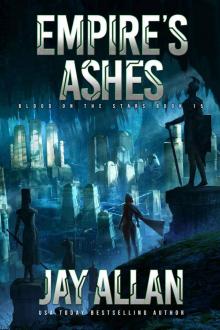 Empire's Ashes (Blood on the Stars Book 15)
Empire's Ashes (Blood on the Stars Book 15) Wings of Pegasus
Wings of Pegasus Crusade of Vengeance
Crusade of Vengeance The Last Stand
The Last Stand Blackhawk: Far Stars Legends I
Blackhawk: Far Stars Legends I Call to Arms: Blood on the Stars II
Call to Arms: Blood on the Stars II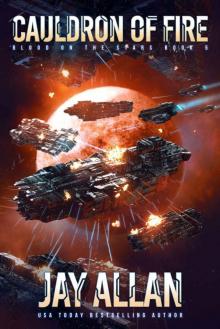 Cauldron of Fire (Blood on the Stars Book 5)
Cauldron of Fire (Blood on the Stars Book 5) Revenge of the Ancients: Crimson Worlds Refugees III
Revenge of the Ancients: Crimson Worlds Refugees III Crimson Worlds Successors: The Complete Trilogy
Crimson Worlds Successors: The Complete Trilogy The Grand Alliance
The Grand Alliance Portal Wars 1: Gehenna Dawn
Portal Wars 1: Gehenna Dawn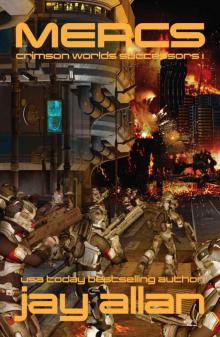 MERCS: Crimson Worlds Successors
MERCS: Crimson Worlds Successors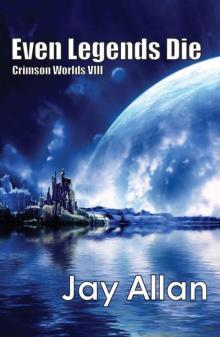 Crimson Worlds: 08 - Even Legends Die
Crimson Worlds: 08 - Even Legends Die Winds of Vengeance
Winds of Vengeance Invasion (Blood on the Stars Book 9)
Invasion (Blood on the Stars Book 9) A Little Rebellion (Crimson Worlds III)
A Little Rebellion (Crimson Worlds III)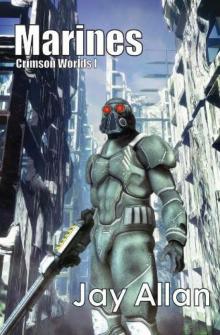 Marines
Marines Black Dawn (Blood on the Stars Book 8)
Black Dawn (Blood on the Stars Book 8)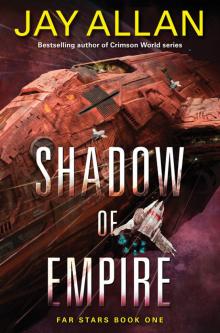 Shadow of Empire
Shadow of Empire Galactic Frontiers: A Collection of Space Opera and Military Science Fiction Stories
Galactic Frontiers: A Collection of Space Opera and Military Science Fiction Stories Winds of Vengeance (Crimson Worlds Refugees Book 4)
Winds of Vengeance (Crimson Worlds Refugees Book 4) Dauntless (Blood on the Stars Book 6)
Dauntless (Blood on the Stars Book 6) Portal Wars: The Trilogy
Portal Wars: The Trilogy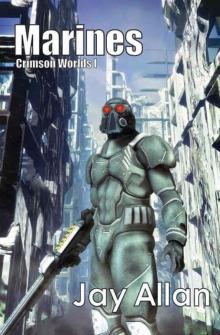 Marines cw-1
Marines cw-1 The Cost of Victory
The Cost of Victory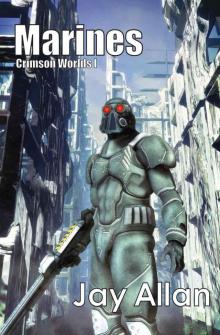 Marines (Crimson Worlds)
Marines (Crimson Worlds)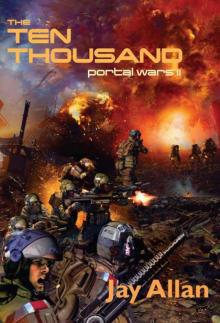 The Ten Thousand: Portal Wars II
The Ten Thousand: Portal Wars II The White Fleet (Blood on the Stars Book 7)
The White Fleet (Blood on the Stars Book 7) Crimson Worlds Collection III
Crimson Worlds Collection III The Black Flag (Crimson Worlds Successors Book 3)
The Black Flag (Crimson Worlds Successors Book 3) Tombstone
Tombstone Gehenna Dawn
Gehenna Dawn A Little Rebellion (Crimson Worlds)
A Little Rebellion (Crimson Worlds)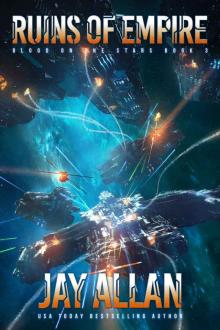 Ruins of Empire: Blood on the Stars III
Ruins of Empire: Blood on the Stars III Dauntless
Dauntless Shadows of the Gods: Crimson Worlds Refugees II
Shadows of the Gods: Crimson Worlds Refugees II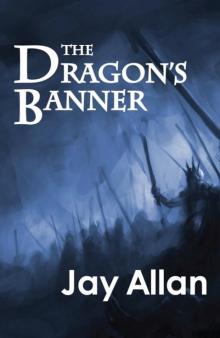 The Dragon's Banner
The Dragon's Banner Echoes of Glory (Blood on the Stars Book 4)
Echoes of Glory (Blood on the Stars Book 4)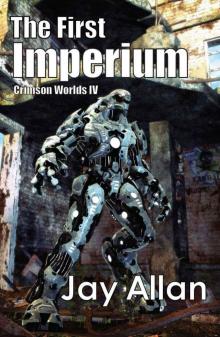 Crimson Worlds: 04 - The First Imperium
Crimson Worlds: 04 - The First Imperium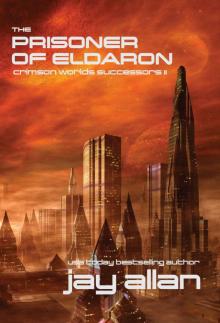 The Prisoner of Eldaron: Crimson Worlds Successors II
The Prisoner of Eldaron: Crimson Worlds Successors II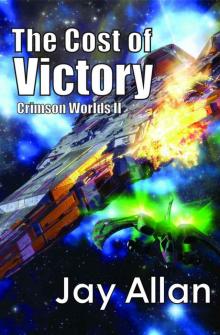 The Cost of Victory (Crimson Worlds)
The Cost of Victory (Crimson Worlds) Duel in the Dark: Blood on the Stars I
Duel in the Dark: Blood on the Stars I Into the Darkness: Crimson Worlds Refugees I
Into the Darkness: Crimson Worlds Refugees I Crimson Worlds Refugees: The First Trilogy
Crimson Worlds Refugees: The First Trilogy The Cost of Victory cw-2
The Cost of Victory cw-2 Stars & Empire 2: 10 More Galactic Tales (Stars & Empire Box Set Collection)
Stars & Empire 2: 10 More Galactic Tales (Stars & Empire Box Set Collection) Flames of Rebellion
Flames of Rebellion Stars & Empire: 10 Galactic Tales
Stars & Empire: 10 Galactic Tales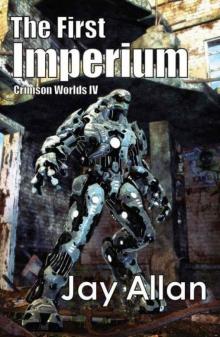 The First Imperium cw-4
The First Imperium cw-4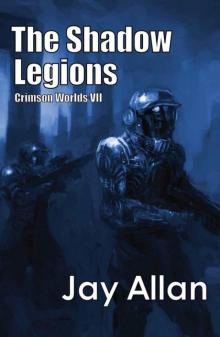 Crimson Worlds: 07 - The Shadow Legions
Crimson Worlds: 07 - The Shadow Legions Storm of Vengeance
Storm of Vengeance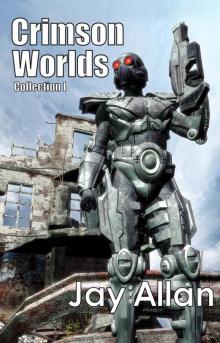 Crimson Worlds Collection I
Crimson Worlds Collection I Rebellion's Fury
Rebellion's Fury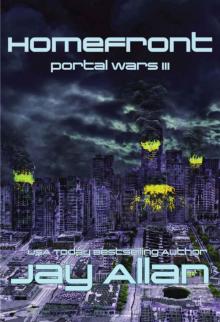 Homefront: Portal Wars III
Homefront: Portal Wars III Tombstone (crimson worlds)
Tombstone (crimson worlds) Crimson Worlds: Prequel - Bitter Glory
Crimson Worlds: Prequel - Bitter Glory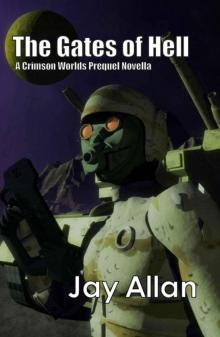 Crimson Worlds: Prequel - The Gates of Hell
Crimson Worlds: Prequel - The Gates of Hell The Fall: Crimson Worlds IX
The Fall: Crimson Worlds IX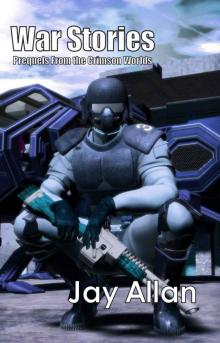 Crimson Worlds: War Stories: 3 Crimson Worlds Prequel Novellas
Crimson Worlds: War Stories: 3 Crimson Worlds Prequel Novellas Enemy in the Dark
Enemy in the Dark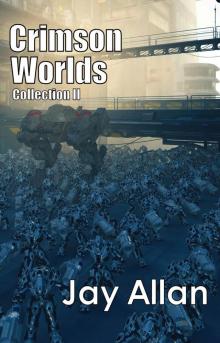 Crimson Worlds Collection II
Crimson Worlds Collection II